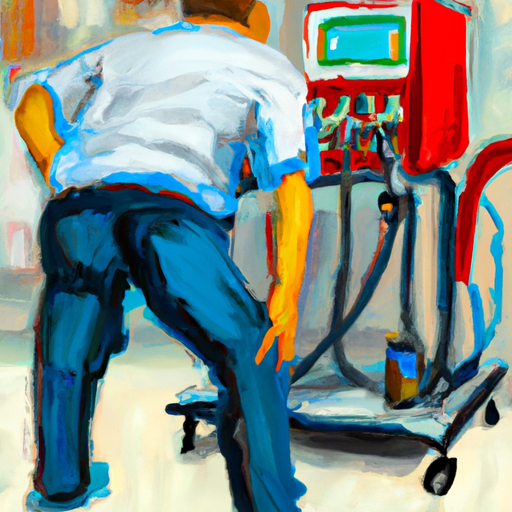Chronic renal failure, also known as chronic kidney disease, is a serious condition that affects millions of people worldwide. It is a progressive and irreversible loss of kidney function that can have a significant impact on an individual's quality of life. This article aims to provide a comprehensive guide to understanding chronic renal failure, including its symptoms, causes, and diagnosis. Additionally, it will explore various treatment options available for managing the condition and discuss the importance of lifestyle changes and prevention strategies in preventing further complications. Whether you or someone you know has been diagnosed with chronic renal failure or you simply want to educate yourself about this condition, this article will serve as a valuable resource to help you navigate through the challenges associated with chronic renal failure.
1. Understanding Chronic Renal Failure: Symptoms, Causes, and Diagnosis
Chronic renal failure, also known as chronic kidney disease (CKD), is a progressive condition that affects the functioning of the kidneys. Understanding the symptoms, causes, and methods of diagnosis is crucial for early detection and effective management of this debilitating condition.
Symptoms of chronic renal failure may vary depending on the stage of the disease. In the early stages, patients often experience no noticeable symptoms. However, as the disease progresses, individuals may develop fatigue, weakness, loss of appetite, difficulty concentrating, frequent urination (especially at night), swelling in the legs and ankles, persistent itching, muscle cramps, and changes in urine output (either increased or decreased).
There are several potential causes of chronic renal failure. The most common causes include diabetes and high blood pressure, which together account for approximately two-thirds of all cases. Other causes may include certain kidney infections, kidney stones, urinary tract obstructions, autoimmune diseases like lupus, inherited kidney disorders, and prolonged use of certain medications that can damage the kidneys.
Diagnosing chronic renal failure typically involves a combination of medical history evaluation, physical examination, and laboratory tests. The doctor may ask about any symptoms experienced, medical history, and family history of kidney disease. A physical examination may reveal signs of fluid retention, high blood pressure, or other kidney-related complications. Laboratory tests such as blood and urine tests are crucial for assessing kidney function, including measuring the levels of waste products like creatinine and urea nitrogen
2. Treatment Options for Chronic Renal Failure: A Comprehensive Guide
Chronic renal failure, also known as chronic kidney disease, is a progressive and irreversible condition that affects the functioning of the kidneys. It occurs when the kidneys are unable to filter waste products and excess fluids from the blood effectively. As the disease progresses, it can lead to various complications and significantly impact a person's quality of life. However, timely diagnosis and appropriate treatment can help manage the symptoms and slow down the progression of the disease.
1. Medications:
One of the primary goals of treatment for chronic renal failure is to manage underlying conditions that may contribute to kidney damage, such as high blood pressure and diabetes. Medications like angiotensin-converting enzyme (ACE) inhibitors and angiotensin II receptor blockers (ARBs) are often prescribed to control blood pressure and reduce proteinuria (excess protein in the urine). Diuretics may be prescribed to help eliminate excess fluid from the body. Additionally, medications to control anemia and manage mineral and bone disorders may also be used.
2. Diet and Fluid Restrictions:
Diet plays a crucial role in the management of chronic renal failure. Patients are often advised to follow a specific dietary plan to reduce the burden on the kidneys and maintain overall health. This typically involves limiting the intake of protein, sodium, and phosphorus. A dietitian can provide personalized recommendations to meet the individual's nutritional needs while managing the disease. Fluid intake may also be restricted, especially in advanced stages of renal failure
3. Lifestyle Changes and Prevention Strategies for Chronic Renal Failure
Lifestyle Changes and Prevention Strategies for Chronic Renal Failure
While chronic renal failure can be a devastating diagnosis, there are certain lifestyle changes and prevention strategies that individuals can adopt to mitigate the risk of developing this condition or slow its progression. Taking proactive steps towards a healthier lifestyle can significantly improve the overall well-being of individuals with kidney disease. Here are some key lifestyle changes and prevention strategies to consider:
1. Manage blood pressure: High blood pressure is one of the leading causes of chronic renal failure. Regularly monitoring blood pressure levels and taking appropriate measures to keep it within a healthy range is crucial. This can be achieved through a combination of medication, regular exercise, a low-sodium diet, limited alcohol consumption, and stress management techniques.
2. Control blood sugar levels: Diabetes is another major risk factor for chronic renal failure. Individuals with diabetes should diligently manage their blood sugar levels through regular monitoring, medication adherence, and a balanced diet. It is important to consult with a healthcare professional for guidance on maintaining optimal blood sugar control.
3. Follow a kidney-friendly diet: Adopting a kidney-friendly diet can significantly reduce the strain on the kidneys and slow the progression of chronic renal failure. This diet typically involves limiting the intake of salt, potassium, and phosphorus. Foods high in these minerals, such as processed foods, fast food, and certain fruits and vegetables, should be consumed in moderation. It is advisable to work with a registered dietitian who specializes in kidney
